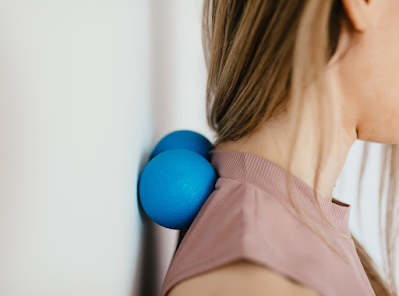Pregnancy and childbirth are miraculous and transformative
experiences, but they can also be physically demanding and stressful on the
body. Postpartum neck pain is a common complaint among new mothers and can
interfere with daily activities and parenting responsibilities. Postpartum neck
pain can be caused by a variety of factors, including hormonal changes, changes
in posture, holding and carrying a newborn, breastfeeding, and lack of sleep.
Fortunately, there are several treatment options available to help alleviate
postpartum neck pain.
Causes of Postpartum Neck Pain:
Hormonal Changes: During pregnancy, the body undergoes
significant hormonal changes to support the growing fetus. One hormone that
increases during pregnancy is relaxin, which helps to loosen the ligaments in
the pelvis to prepare for childbirth. However, this hormone can also cause the
ligaments in the neck and shoulders to become more relaxed, which can lead to
strain and pain.
Changes in Posture: Pregnancy and childbirth can also cause
changes in posture, particularly as the weight of the growing fetus shifts the
body’s center of gravity. This can cause the muscles in the neck and shoulders
to become strained and overworked, leading to pain and discomfort.
Holding and Carrying a Newborn: New mothers are often
required to hold and carry their newborns for extended periods of time, which
can put strain on the neck and shoulders. Improper positioning or holding of
the baby can also contribute to postpartum neck pain.
Breastfeeding: Breastfeeding is another common cause of
postpartum neck pain. Holding the baby in position for extended periods of time
can cause strain on the neck and shoulders. The weight of the breasts can also
cause strain and discomfort in the neck and upper back.
Lack of Sleep: New mothers often experience sleep
deprivation due to the demands of caring for a newborn. Lack of sleep can cause
muscle tension and fatigue, which can lead to postpartum neck pain.
Postpartum neck pain treatment options:
- Physical
Therapy:
Physical therapy can be an effective treatment for
postpartum neck pain. A physical therapist can work with you to develop an
exercise program that targets the specific muscles that are causing your pain.
They can also provide advice on proper posture and body mechanics while holding
and carrying your baby. This can help to alleviate pain and prevent further
injury.
- Massage:
Massage can also be an effective treatment for postpartum
neck pain. A licensed massage therapist can use a variety of techniques to help
relieve muscle tension and improve circulation. This can help to reduce pain
and promote healing. Some women may also find relief from self-massage
techniques, such as gently massaging the neck and shoulders with their hands or
using a foam roller.
- Heat
and Cold Therapy:
Heat and cold therapy can be used to help relieve postpartum
neck pain. Applying heat to the affected area can help to increase blood flow
and reduce muscle tension. A heating pad or warm compress can be applied to the
neck and shoulders for 15-20 minutes at a time. Cold therapy, such as an ice
pack, can help to reduce inflammation and swelling. This can be applied for
10-15 minutes at a time.
- Medication:
Over-the-counter pain relievers, such as acetaminophen and
ibuprofen, can be used to help relieve postpartum neck pain. However, it’s
important to talk to your healthcare provider before taking any medication, as
some medications may not be safe for breastfeeding mothers. Your healthcare
provider can help you determine which medication is safe and effective for you.
- Chiropractic
Care:
Chiropractic care can also be an effective treatment for
postpartum neck pain. A chiropractor can use manual techniques to adjust the
spine and neck, which can help to relieve pain and improve range of motion.
Some chiropractors may also use complementary therapies, such as acupuncture or
massage, to help alleviate pain.
- Ergonomic
Adjustments:
Making ergonomic adjustments can also help to alleviate
postpartum neck pain. This may include using a nursing pillow to support your
baby while breastfeeding, using a baby carrier to distribute the weight of the
baby evenly, and using proper posture while holding and carrying your baby.
Your healthcare provider or a physical therapist can provide advice on proper
body mechanics and ergonomic adjustments to help alleviate pain.
Postpartum neck pain home exercises
In addition to seeking professional treatment for postpartum
neck pain, there are also several home exercises and stretches that can help
alleviate pain and discomfort. It’s important to talk to your healthcare
provider before starting any new exercise program, as some exercises may not be
safe or appropriate for every individual.
- Neck
Stretches: Simple neck stretches can help alleviate tension and pain in
the neck muscles. Gently tilt your head to one side, holding for 10-15
seconds, and then repeat on the other side. You can also gently tilt your
head forward, backward, and to each side, holding each stretch for 10-15
seconds. - Shoulder
Rolls: Shoulder rolls can help to loosen the muscles in the neck and
shoulders. Simply roll your shoulders forward and backward in a circular
motion, focusing on relaxing the muscles in the neck and shoulders. - Chest
Stretches: Chest stretches can help alleviate tension and pain in the
chest and shoulder muscles, which can contribute to postpartum neck pain.
You can do a simple chest stretch by standing in a doorway and placing
your hands on the door frame at shoulder height. Lean forward gently,
feeling a stretch in the chest muscles. - Posture
Exercises: Improving your posture can help alleviate postpartum neck pain.
Simple exercises like shoulder blade squeezes can help to strengthen the
muscles in the upper back and improve posture. Simply squeeze your
shoulder blades together, holding for a few seconds, and then release. - Breathing
Exercises: Deep breathing exercises can help to reduce stress and tension
in the body, which can contribute to postpartum neck pain. Sit or lie down
in a comfortable position and take slow, deep breaths, focusing on
relaxing the muscles in the neck and shoulders.
These exercises can be done at home, and can be incorporated
into your daily routine to help manage postpartum neck pain. It’s important to
start slowly and gently, and to stop any exercise that causes pain or
discomfort. It’s also important to talk to your healthcare provider before
starting any new exercise program, particularly if you have any medical
conditions or complications. With the right exercises and stretches, new
mothers can successfully manage postpartum neck pain and enjoy the joys of
motherhood without discomfort or limitation.
Prevention of Postpartum neck pain:
Prevention is key when it comes to postpartum neck pain.
Here are some tips to help prevent postpartum neck pain:
- Use
proper posture while holding and carrying your baby. Avoid hunching over
or slouching, and keep your shoulders back and relaxed. - Use a
nursing pillow to support your baby while breastfeeding. This can help to
alleviate strain on your neck and shoulders. - Use a
baby carrier to distribute the weight of the baby evenly. This can help to
reduce strain on your neck, shoulders, and back. - Take
breaks and rest when you can. Avoid overexerting yourself and take time to
rest and recover. - Stay
hydrated and maintain a healthy diet. Proper hydration and nutrition can
help to promote healing and reduce inflammation.
Postpartum neck pain can be a frustrating and painful
experience. However, as described earlier there are several treatment options
available to help alleviate pain and promote healing. Physical therapy,
massage, heat and cold therapy, medication, chiropractic care, and ergonomic
adjustments are all effective treatment options for postpartum neck pain. It’s
important to talk to your healthcare provider before starting any treatment, as
some treatments may not be safe or appropriate for every individual.
Prevention is also important when it comes to postpartum
neck pain. Simple changes to your posture, using supportive tools like nursing
pillows and baby carriers, taking breaks, and maintaining a healthy diet and
hydration can all help to prevent postpartum neck pain from developing or
worsening.
It’s important to seek treatment for postpartum neck pain as
soon as possible, as untreated pain can lead to further complications and even
chronic pain. With the right treatment and prevention strategies in place,
women can successfully manage and alleviate postpartum neck pain and enjoy the
joys of motherhood without discomfort or limitation.
Reference:https://academic.oup.com/bjaed/article/11/5/181/282861


